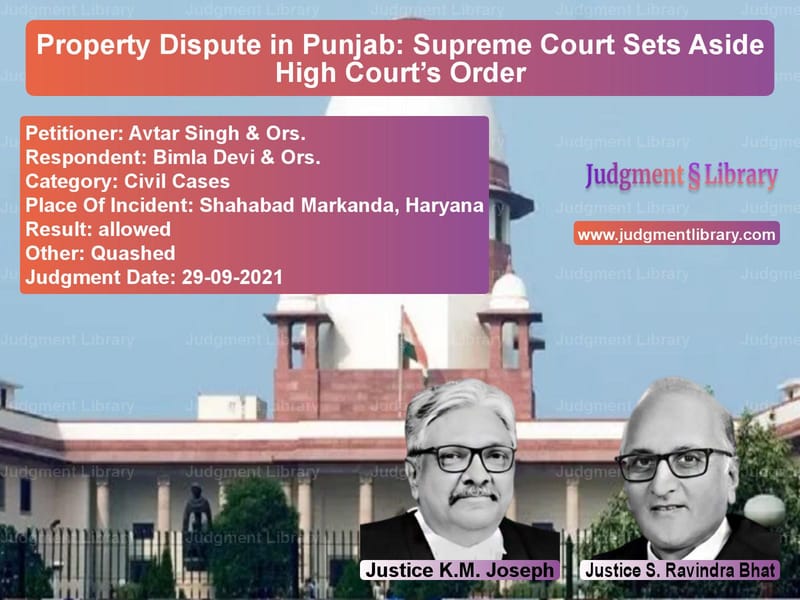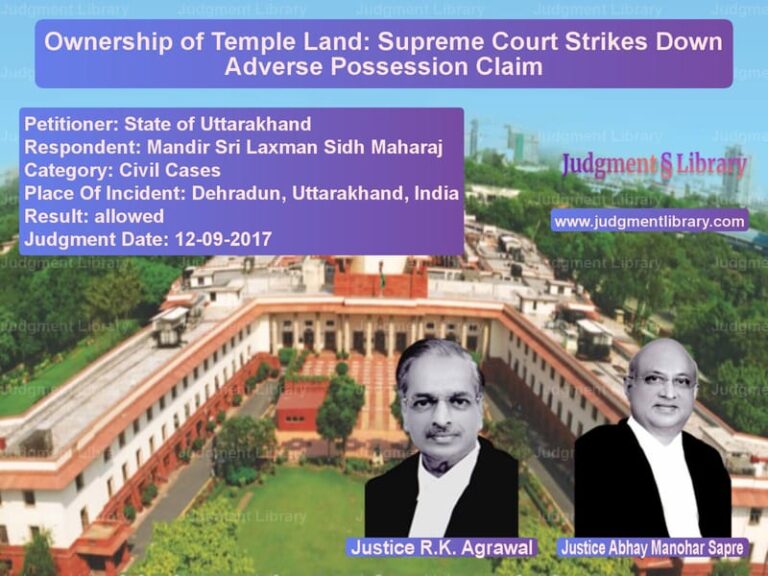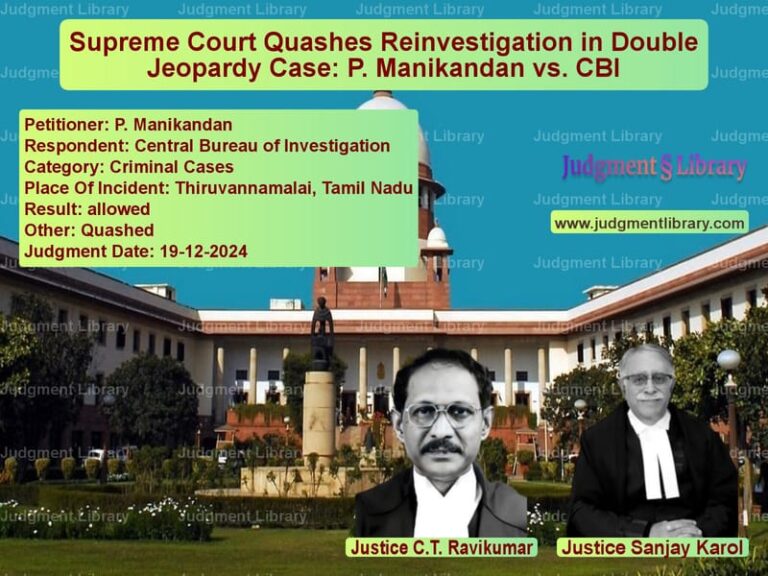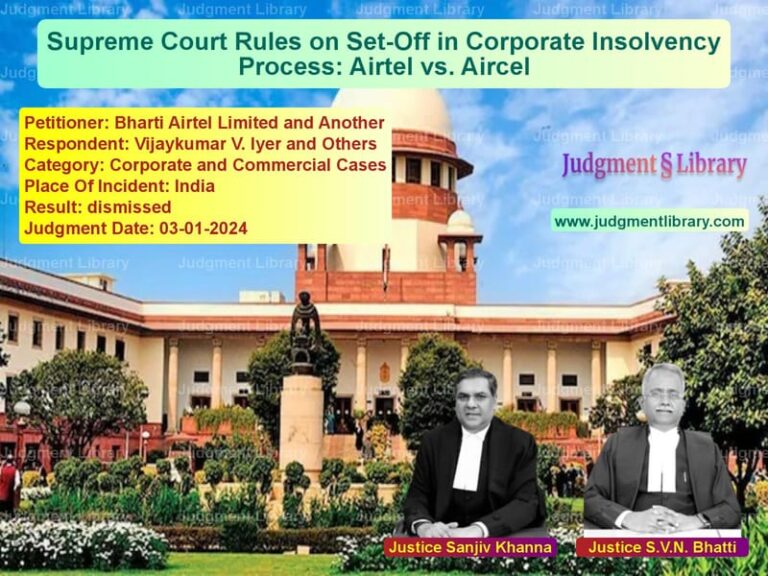Property Dispute in Punjab: Supreme Court Sets Aside High Court’s Order
The Supreme Court of India recently delivered a judgment in the case of Avtar Singh & Ors. vs. Bimla Devi & Ors., setting aside a Punjab and Haryana High Court decision regarding a long-standing property dispute. The case revolved around conflicting claims of ownership and possession over a piece of land in Shahabad Markanda, Haryana. The Supreme Court ruled in favor of the appellants, reinstating the findings of the trial and first appellate courts, which had dismissed the respondents’ claims.
Background of the Case
The property in question, located at GT Road, Shahabad Markanda, was purchased in the name of Girdhari Lal, the first defendant, allegedly in lieu of compensation for properties left in Pakistan after partition. According to the respondents, the property belonged to a Hindu Undivided Family (HUF) consisting of Rajpal (second plaintiff), his father, and Girdhari Lal.
In 1961, Girdhari Lal agreed to sell a portion of the property to Bimla Devi, the first plaintiff, for ₹2,500. The respondents claimed that possession was handed over to Bimla Devi at the time, and that Girdhari Lal had no further rights over the property except for executing a formal sale deed.
Over the years, the plaintiffs undertook various construction activities, including demolishing old structures and rebuilding a residential house in 1978. However, in 2000, the defendants allegedly attempted to take forcible possession of the property, leading to the filing of the present suit.
Arguments by the Petitioners (Avtar Singh & Ors.)
- The petitioners contended that Girdhari Lal was the sole owner of the property and had never entered into an agreement to sell it to Bimla Devi or Rajpal.
- They argued that Bimla Devi and Rajpal failed to produce any registered document proving their claim of ownership.
- The petitioners emphasized that the trial court and first appellate court had correctly found that the plaintiffs had no legal right over the disputed property.
- They pointed out that the High Court exceeded its jurisdiction under Section 100 of the Civil Procedure Code by re-evaluating factual findings.
Arguments by the Respondents (Bimla Devi & Ors.)
- The respondents claimed that the property was part of a joint family estate and that Girdhari Lal was merely a trustee of the family property.
- They argued that possession had been transferred to them in 1961, and they had since made substantial constructions.
- The respondents relied on a local commissioner’s report, which confirmed that structural modifications had been made to the property.
- They asserted that the trial and first appellate courts had ignored key evidence supporting their claim.
Supreme Court’s Key Observations
The Supreme Court analyzed the legal issues and noted:
- The findings of the trial court and first appellate court were based on sound reasoning and evidence.
- The High Court overstepped its jurisdiction by interfering with concurrent factual findings, which is impermissible under Section 100 of the Civil Procedure Code.
- The plaintiffs failed to produce a registered sale deed or any other legally admissible document proving their ownership.
- The local commissioner’s report, though relevant, could not override the absence of a legally recognized title.
Final Verdict
Based on these observations, the Supreme Court:
- Allowed the appeal, setting aside the High Court’s judgment.
- Reinstated the findings of the trial and first appellate courts, which had dismissed the respondents’ claims.
- Emphasized that property disputes must be resolved based on valid documentation and legal ownership rights.
Implications of the Judgment
The ruling has significant implications for property disputes in India:
- Significance of Registered Documents: The judgment reinforces the principle that property ownership claims must be backed by legally admissible documents.
- Limited Scope of High Court Review: The ruling clarifies that High Courts cannot interfere with concurrent factual findings unless there is a substantial question of law.
- Protection of Legal Owners: The verdict ensures that rightful property owners are protected from false claims based on possession alone.
- Importance of Procedural Compliance: The decision underscores the necessity of following proper legal procedures in property transactions.
Conclusion
The Supreme Court’s ruling in Avtar Singh & Ors. vs. Bimla Devi & Ors. serves as a critical precedent in property law. By setting aside the High Court’s erroneous interference, the judgment upholds the importance of registered ownership and legal documentation in resolving property disputes. It also reaffirms the principle that appellate courts must adhere to their jurisdictional limits, ensuring that lower court findings are not disturbed without a compelling legal basis.
Read also: https://judgmentlibrary.com/iit-admission-criteria-dispute-supreme-court-upholds-iits-policy/
Petitioner Name: Avtar Singh & Ors..Respondent Name: Bimla Devi & Ors..Judgment By: Justice K.M. Joseph, Justice S. Ravindra Bhat.Place Of Incident: Shahabad Markanda, Haryana.Judgment Date: 29-09-2021.
Don’t miss out on the full details! Download the complete judgment in PDF format below and gain valuable insights instantly!
Download Judgment: avtar-singh-&-ors.-vs-bimla-devi-&-ors.-supreme-court-of-india-judgment-dated-29-09-2021.pdf
Directly Download Judgment: Directly download this Judgment
See all petitions in Property Disputes
See all petitions in Landlord-Tenant Disputes
See all petitions in Judgment by K.M. Joseph
See all petitions in Judgment by S Ravindra Bhat
See all petitions in allowed
See all petitions in Quashed
See all petitions in supreme court of India judgments September 2021
See all petitions in 2021 judgments
See all posts in Civil Cases Category
See all allowed petitions in Civil Cases Category
See all Dismissed petitions in Civil Cases Category
See all partially allowed petitions in Civil Cases Category







